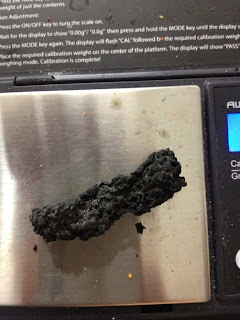(Partners: Victoria L., Zac L.)
Observations:
Data:
Mass of Water: 100g Initial Temp of water: 18_̊C
Mass of food before: 1.52g Final Temp of water: 42.5 _̊C
Mass of food after: .22g Change in water Temp: 24.5_̊C
Mass of food burned: 1.3g Calories on package: 5.36Cal
Questions/Calculations:
1. Heat absobed by water (J): (use q=mcΔT) = 10250.8J
2. Heat released per gram of your food (J/g). (Remember: qH2O = -qfood) = -7885.2J/g
3. Heat released by your food in calories (cal): 1 calorie = 4.184J = 1623.2cal
4. Heat released by your food in Calories (cal): 1 calorie = 1000 cal = 1.6232cal
5. Percent Error=Actual - Theoretical/Theoretical x100 = 40.2%
6. Do you think this experiment would be appropriate for all types of food? Why or Why not?
No, because not all foods burn the same way. So when you burn another food the measurement of calories could be off and not be rational.
7. Describe 3 possible sources of error and how they affected the outcome of the experiment.
1. We did not let the cheese doodle completely cool to room temperature.
2. We did not collect the complete sample of the cheese doodle because some broke off.
3. Some of the heat was lost because the cheese doodle was not properly positioned.
8. A student performed this experiment using a salted peanut. Before it was burned, the peanut weighed 0.353g. After burning, the residue weighed 0.016g. The energy released by the combustion increased the temperature of 200.0mL of water in the calorimeter by 7.2̊C.
4. Heat released by your food in Calories (cal): 1 calorie = 1000 cal = 1.6232cal
5. Percent Error=Actual - Theoretical/Theoretical x100 = 40.2%
6. Do you think this experiment would be appropriate for all types of food? Why or Why not?
No, because not all foods burn the same way. So when you burn another food the measurement of calories could be off and not be rational.
7. Describe 3 possible sources of error and how they affected the outcome of the experiment.
1. We did not let the cheese doodle completely cool to room temperature.
2. We did not collect the complete sample of the cheese doodle because some broke off.
3. Some of the heat was lost because the cheese doodle was not properly positioned.
8. A student performed this experiment using a salted peanut. Before it was burned, the peanut weighed 0.353g. After burning, the residue weighed 0.016g. The energy released by the combustion increased the temperature of 200.0mL of water in the calorimeter by 7.2̊C.
A) Calculate the mass of peanut consumed in the combustion. .337g
B) Calculate the total energy absorbed by the water in this experiment. 9,037.44J
C) Calculate the energy released per gram of the peanut. 26817.33J
B) Calculate the total energy absorbed by the water in this experiment. 9,037.44J
C) Calculate the energy released per gram of the peanut. 26817.33J




For #7, the biggest source of error is the fact that not all of the heat goes into the water in the can. Heat radiates out and without some way to direct it all toward the can, it is impossible to get 0% error.
ReplyDeleteSmall calculation mistake in #8B. Should only be around 6000J. Probably simply putting the wrong number in the calculator.